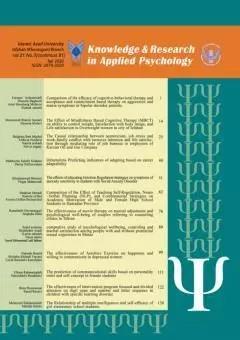تأثیر آموزش کارکردهای اجرایی بر مشکلات عاطفی-رفتاری کودکان پیش دبستانی در شهر اصفهان
الموضوعات : Educational
1 - کارشناس ارشد روانشناسی بالینی، واحد خمینی شهر، دانشگاه آزاد اسلامی اصفهان واحد خمینی شهر، اصفهان، ایران.
2 - استاد گروه روانشناسی، دانشگاه اصفهان، اصفهان، ایران.
الکلمات المفتاحية: مشکلات عاطفی- رفتاری, کارکردهای اجرایی, کودکان پیش دبستانی.,
ملخص المقالة :
هدف از این پژوهش بررسی اثربخشی آموزش کارکردهای اجرایی (بازداری پاسخ، حافظه فعال، انعطافپذیری و حفظ توجه) بر مشکلات عاطفی – رفتاری کودکان پیش دبستانی بوده است. طرح پژوهش نیمه آزمایشی از نوع پیش آزمون-پس آزمون با گروه کنترل بوده است. جامعه آماري شامل کليه کودکان پيش دبستاني 5- 6 ساله داراي مشکلات عاطفی-رفتاری در شهر اصفهان در سال تحصیلی 96-1395 بود. برای انجام پژوهش نمونهای شامل30 نفر از این کودکان بصورت تصادفی خوشهای انتخاب و در دو گروه آزمایش و کنترل (هر گروه 15 نفر) بصورت تصادفی گمارده شدند و گروه آزمایش تحت مداخله قرار گرفت. در پیشآزمون و پسآزمون، مشکلات عاطفی- رفتاری توسط مقیاس سیاهه رفتاری کودک (CBCL) آخنباخ (Achenbach, 1991) سنجیده شد. دادهها با استفاده از تحلیل کوواریانس مورد تجزیه و تحلیل قرار گرفتند. نتایج نشان داد که مداخله برای گروه آزمایش معنی دار است و آموزش کارکردهای اجرایی بر مشکلات عاطفی-رفتاری (اضطراب، افسردگی، شکایات جسمانی، مشکلات اجتماعی، اختلالات تفکر، مشکلات توجه، رفتار قانونشکنی و رفتار پرخاشگری) موثر هستند (001/0>P).
Achenbach, T. M. (1991). Manual for the Teacher's Report Form and 1991 profile. Univ Vermont/ Department Psychiatry.
Achenbach, T. M. & Rescorla, L.A. (2007). Aachenbach Experience-Based System Age Forms Handbook (ASEBA), translated by A. Minaei, Tehran: Research Institute for Exceptional Children. (Date of publication of the original work 2001).
Achenbach, T.M. & Rescorla, L.A. (2001).ASEBA school age forms profiles. Burlington: University of Vermont, research center for children, youth & families.
Alizadeh, H. (2006). Relationship between neurocognitive executive functions and developmental disorders, Cognitive Science News, 4, 70- 57. [Persian]
Ardilla, A. (2008). On the evolutionary origins of executive functions. Brain and Cognition, 68, 92–99.
Blakey, E., Matthews, D., Cragg, L., Buck, J., Cameron, D., Higgins, B., ... & Carroll, D. J. (2020). The role of executive functions in socioeconomic attainment gaps: Results from a randomized controlled trial. Child Development.
Blair, C., Zelazo, D., & Greenberg, M. (2005). The measurement of executive function in early childhood. Journal of Developmental Neuropsychology, 28(2), 561 – 571.
Denckla, M. B. (1996). A theory and model of executive function: A neuropsychological perspective. In G. R. Lyon & N. A. Krasnegor (Eds.), Attention, memory and executive. Baltimore: Brookes.
Delavar, Ali (2006). Research and Evaluation Guide, Tehran: Arasbaran Publications. [Persian]
Ebrahimi, A.A., Abedi, A. (2015). Strengthen executive skills in preschool and elementary school children. Isfahan: Written publication, first edition. [Persian]
Fletcher, J.M., Lyone, G.R., Funchs, L.S., & Barnes, MA. (2007). Learning disabilities (from identification to intervention). New yourk: Guilford pres.
Kana RK, Keller TA, Cherkassky VL, Minshew NJ, Just MA. (2007). Sentence comprehension in autism: Thinking in pictures with decreased functional connectivity. Brain 129 (Pt 9). 2484 –93.
Kirk, S. A., Gallagher, J. J., Anastasiow, N. J, & Coleman, M. R. (2006). Educating Exceptional Children. Boston: Houghton Mifflin.
Lantrip, C., Isquith, P. K., Koven, N. S., Welsh, K., & Roth, R. M. (2016). Executive function and emotion regulation strategy use in adolescents. Applied Neuropsychology: Child, 5(1), 50-55.
Liddon, C. J., Zarcone, J. R., Pisman, M., & Rooker, G. W. (2016). Examination of behavioral flexibility and function of severe challenging behavior in individuals with autism and intellectual disability. International Journal of Developmental Disabilities, 62(3), 167-173
Malekpour M, Kavianpour F, and Abedi A. (2013). Efficacy of executive functions training (response inhibition) on the attention of preschool children with developmental coordination disorder: A single-subject research. J Res Behav Sci, 11(2): 108-20. [Persian]
Michel E, Roethlisberger M, Neuenschwander R, Roebers CM. (2011). Development of cognitive skills in children with motor coordination impairments at 12-month follow-up. Child Neuropsychol; 17(2): 151-72.
Minaei, Asghar (2005). Handbook of Achenbach Experience-Based School Age Forms: Adaptation and Standardization, Tehran: Exceptional Children Research Institute. [Persian]
Roman, G. D., Ensor, R., & Hughes, C. (2016). Does executive function mediate the path from mothers’ depressive symptoms to young children’s problem behaviors?. Journal of experimental child psychology, 142, 158-170.
Saif Naraghi, M. and Naderi, A. (2010). Behavioral disorders in children and methods of its correction and repair. Tehran: Badr. [Persian]
Sulik MJ, Blair C, Mills-Koonce R, Berry D, Greenberg M. (2015). Early Parenting and the Development of Externalizing Behavior Problems: Longitudinal Mediation Through Children's Executive Function. Child Dev; 86(5):1588-603.
Vaziri, A., Ahadi, H., Makvandi, B., Asgari, P., Bakhtiyari, S. (2016), Comparison of the effectiveness of executive function training and parental management in reducing the symptoms of anxiety disorders. Psychological Methods and Models, 7 (23): 115-99. [Persian]
Valinejad, Y. (2014). The effectiveness of pattern-based guidance training on improving working memory and math performance and reducing the symptoms of students' emotional-behavioral problems. PhD Thesis in Educational Psychology, University of Tabriz. [Persian]
Verma N.(2014). Psychological intervention for specific learning disability: A case report. Psychological intervention for specific learning disability;1(4): 86-90.
Wissink IB, Dekovic M, Yagmur S, Stams GJ, de Haan M.(2008). Ethnic identity, externalizing problem behavior and the mediating role of self-esteem among Dutch, Turkish-Dutch and Moroccan-Dutch adolescents. J Adolesc; 31(2): 223-40.
Wood JJ, Cowan PA, Baker BL.(2002). Behavior problems and peer rejection in preschool boys and girls. Journal of Experimental Psychology: General; 163(1): 72-88.


